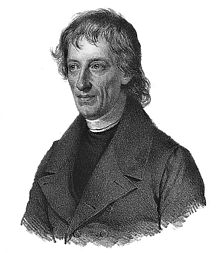
Back برنارد بولزانو Arabic برنارد بولزانو ARZ Bernhard Bolzano Azerbaijani برنارد بولتسانو AZB Бернард Бальцана Byelorussian Бернард Болцано Bulgarian Bernard Bolzano Catalan Bernard Bolzano Czech Bernard Bolzano Welsh Bernard Bolzano Danish
Bernard Bolzano | |
|---|---|
 | |
| Born | Bernardus Placidus Johann Nepomuk Bolzano 5 October 1781 |
| Died | 18 December 1848 (aged 67) Prague, Kingdom of Bohemia |
| Education | University of Prague (PhD, 1804) |
| Era | Modern philosophy |
| Region | Western philosophy |
| School | Logical objectivism[1][2] Utilitarianism[3] Classical liberalism |
| Institutions | University of Prague (1805–1819) |
| Thesis | Betrachtungen über einige Gegenstände der Elementargeometrie (Considerations on Some Objects of Elementary Geometry) (1804) |
| Academic advisors | Franz Josef Gerstner |
| Notable students | Robert von Zimmermann |
Main interests | Logic, epistemology, theology |
Notable ideas | Logical objectivism[1] Bolzano's theorem (the first purely analytic proof of the intermediate value theorem) Bolzano–Weierstrass theorem (ε, δ)-definition of limit Least-upper-bound property |
| Ecclesiastical career | |
| Religion | Christianity |
| Church | Catholic Church |
| Ordained | 1805[4] |
Bernard Bolzano (UK: /bɒlˈtsɑːnoʊ/, US: /boʊltˈsɑː-, boʊlˈzɑː-/; German: [bɔlˈtsaːno]; Italian: [bolˈtsaːno]; born Bernardus Placidus Johann Nepomuk Bolzano; 5 October 1781 – 18 December 1848)[5] was a Bohemian mathematician, logician, philosopher, theologian and Catholic priest of Italian extraction, also known for his liberal views.
Bolzano wrote in German, his native language.[6] For the most part, his work came to prominence posthumously.
- ^ a b Routledge Encyclopedia of Philosophy (1998): "Ryle, Gilbert (1900-76)."
- ^ Sandra Lapointe, "Bolzano's Logical Realism", in: Penelope Rush (ed.), The Metaphysics of Logic, Cambridge University Press, 2014, pp. 189–208.
- ^ Morscher, Edgar. "Bernard Bolzano". In Zalta, Edward N. (ed.). Stanford Encyclopedia of Philosophy.
- ^ Paul Rusnock, Jan Sebestík, Bernard Bolzano: His Life and Work, Oxford University Press, 2019, p. 33.
- ^ Chisholm, Hugh, ed. (1911). . Encyclopædia Britannica (11th ed.). Cambridge University Press.
- ^ O'Hear, Anthony (1999), German Philosophy Since Kant, Royal Institute of Philosophy Supplements, Royal Institute of Philosophy London, vol. 44, Cambridge University Press, p. 110, ISBN 9780521667821,
His native language was German.